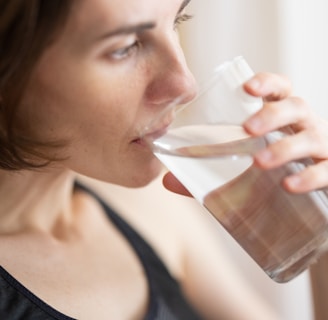Common Mistakes People Make When Drinking Water (and How to Avoid Them)
Discover the most common mistakes people make when drinking water, such as cold water and drinking before bed. Learn healthier hydration habits for better health.
WELLNESSHEALTHBLOG-LIST
8/17/20252 min read


In Brief
Drinking water is essential for life, but certain habits can reduce its benefits—or even harm your health. Whether it’s cold water after a meal or drinking before bed, these common mistakes can disrupt digestion, sleep, or overall well-being. In this article, we explore frequent hydration mistakes and share the best practices for drinking water properly.
Table of Contents
Why Water Is Essential
Common Mistakes to Avoid
Drinking too much water at once
Cold water after meals
Drinking just before bed
Confusing thirst with hunger
Best Hydration Practices
FAQ
Conclusion
Why Water Is Essential
Water makes up about 60% of the human body and plays a vital role in regulating temperature, flushing out toxins, and maintaining organ health. Proper hydration also improves focus, energy, and digestion.
👉 You can also check our articles on the best hydrating foods and how to naturally boost your energy.
Common Mistakes to Avoid
1. Drinking too much water at once
Chugging down a liter of water in a few minutes can overload the kidneys and dilute blood electrolytes. This can even cause hyponatremia (low sodium levels in the blood).
➡ Instead, sip small amounts of water regularly throughout the day.
2. Cold water after meals
Drinking cold water right after eating may slow down digestion by constricting blood vessels and solidifying dietary fats (NIH).
➡ Choose room-temperature or slightly cool water to support better nutrient absorption.
3. Drinking just before bed
Drinking a lot of water right before going to bed often leads to frequent nighttime urination, disrupting your sleep cycle.
➡ Stay hydrated throughout the day and reduce water intake in the hour before sleep.
4. Confusing thirst with hunger
Many people mistake thirst for hunger, leading to unnecessary snacking and calorie intake.
➡ Try drinking a glass of water before eating to determine if you’re really hungry.
Best Hydration Practices
Drink 1.5 to 2 liters of water per day, adjusting for activity level and climate.
Prefer room-temperature water for better absorption.
Start the day with a glass of water on an empty stomach to kickstart metabolism.
Alternate plain water with herbal teas or naturally flavored water (lemon, cucumber, mint).
👉 For more, read our tips on common mistakes to avoid for better sleep and how to stimulate your lymphatic system naturally.
FAQ
1. Is it bad to drink a lot of water at once?
Yes, it can upset electrolyte balance and strain the kidneys. Sipping throughout the day is safer.
2. Why avoid cold water?
Because it may slow digestion and cause bloating or discomfort.
3. Is drinking water before bed harmful?
Not harmful, but in large amounts it may interrupt your sleep by causing you to wake up often.
4. What’s the best type of water to drink?
Tap water (when safe in your area) or lightly mineralized bottled water works well for most people.
Conclusion
Hydration isn’t just about “drinking more water.” Mistakes like drinking cold water after meals or consuming too much before bed can disturb digestion and sleep. By making small adjustments, you can maximize the health benefits of water.
💡 Action step: Start your day with a large glass of room-temperature water, then sip consistently throughout the day to stay hydrated.
⚠ Disclaimer: This article is for informational purposes only and does not replace medical advice. Always consult a healthcare professional for personalized recommendations.
✍️ Written by Narcisse Bosso, certified naturopath. His lifelong passion for health became a profound calling after a loved one passed away from a natural illness that could have been prevented with simple lifestyle changes and habits.
